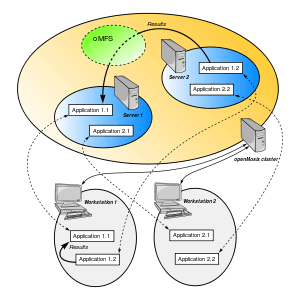LinuxPMI

LinuxPMI (Linux Process Migration Infrastructure) is a Linux kernel extension for multi-system-image (in contrast to a single-system image) clustering. The project is a continuation of the abandoned openMosix clustering project.
Function
How LinuxPMI works is perhaps best described by an example. You may have a network of ten computers (nodes) and there is one user working on each node. Nine users are working on simple tasks that do not necessarily use their machine to the full potential. One user is working on a program that spawns a lot of jobs that would overload their computer. Since we have nine nodes on the network that have a lot of free resources, they can basically take over some of the jobs from the one computer that would otherwise be overloaded. In other words, LinuxPMI will migrate jobs from busy computers to computers that are able to perform the same task faster. Even if all ten users were using their machines for heavy tasks, it could be that not all machines are fully occupied at the same time, and LinuxPMI will use these to reduce the load on other machines.
This is in many ways similar in principle to how a multi-user operating system manages workload on a multi-CPU system; however, LinuxPMI can have machines (nodes) with several CPUs. You can also add or remove nodes on a running cluster thus expanding or reducing the total computing power of the system.
In short it means that ten computers are able to work as one large computer; however, there is no master machine, so each machine can be used as an individual workstation.